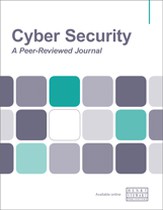NATO: Stepping up its game in cyber defence
Abstract
Events in 2016 significantly raised the importance of cyberattacks, not just to NATO governments but to societies as well. The interference of Russia in the US election campaign, the first major cyberattack through the Internet of Things, the disruption of the Ukrainian energy grid and the publicity given to the greater use of cyber instruments against ISIL or the North Korean missile programme all served to increase public awareness of the multiplicity of the cyberthreat — whether for intelligence gathering, hybrid warfare operations, disruption or even outright destruction, not forgetting in the process the more traditional understanding of cyber as a growing domain of criminal activity. Against this background, NATO has had to raise its game in improving its own cyber defences. This paper outlines the various approaches the Alliance has taken and covers, in particular, NATO’s Cyber Defence Pledge to improve the investments, capability development and internal coordination of its member states; NATO’s recognition of cyber as an operational domain and what this means for NATO’s ability to conduct its missions in a cyber-contested military environment; and finally what NATO is doing to further assist its member states to develop their own capabilities by facilitating education and training, operational exercises, smart defence projects and engagement with industry through the NATO cyber industry partnership. The paper is intended to give a sense to the reader of where NATO is going and is likely to go in the future in making cyber defence part of its core collective defence mission.
The full article is available to subscribers to the journal.
Author's Biography
Jamie Shea is NATO Deputy Assistant Secretary General for Emerging Security Challenges. He has been working with NATO since 1980. Positions included Director of Policy Planning in the Private Office of the Secretary General, Deputy Assistant Secretary General for External Relations, Public Diplomacy Division, Director of Information and Press, Spokesman of NATO and Deputy Director of Information and Press, Deputy Head and Senior Planning Officer in the Policy Planning and Multilateral Affairs Section of the Political Directorate as well as Assistant to the Secretary General of NATO for Special Projects. Outside NATO, he is involved with several prominent academic institutions. He is a professor at the Collège d’Europe, Bruges, visiting lecturer in the Practice of Diplomacy, University of Sussex, Associate Professor of International Relations at the American University, Washington DC, where he also holds the position of director of the Brussels Overseas Study Programme. He also lectures at the Brussels School of International Studies at the University of Kent and at the Security and Strategy Institute of the University of Exeter, where he is an honorary fellow. He is also a senior transatlantic fellow of the German Marshall Fund of the United States and a senior fellow at the London School of Economics, where he teaches a course on crisis management and political communication. He is a regular lecturer and conference speaker on NATO and European security affairs and on public diplomacy, political communication and many other areas of contemporary international relations. He holds a DPhil in modern history from Oxford University (Lincoln College), 1981. Among his many associations and memberships, he is a member of the Advisory Board, Security and Defence Programmes at Chatham House, a member of the Policy Council at the World Economic Forum in Geneva and founder and member of the Board, Security and Defence Agenda Brussels and Friends of Europe. He serves on the Board of the Danish Defence College, Copenhagen, and the Académie Diplomatique Internationale in Paris. He is a recipient of the Golden Eagle medal of the Republic of Albania and the Linden medal of the Czech Republic. He was European Communicator of the Year in 1999 and in 2016 was awarded the International Prize for Human Rights of the AAB University in Kosovo.
